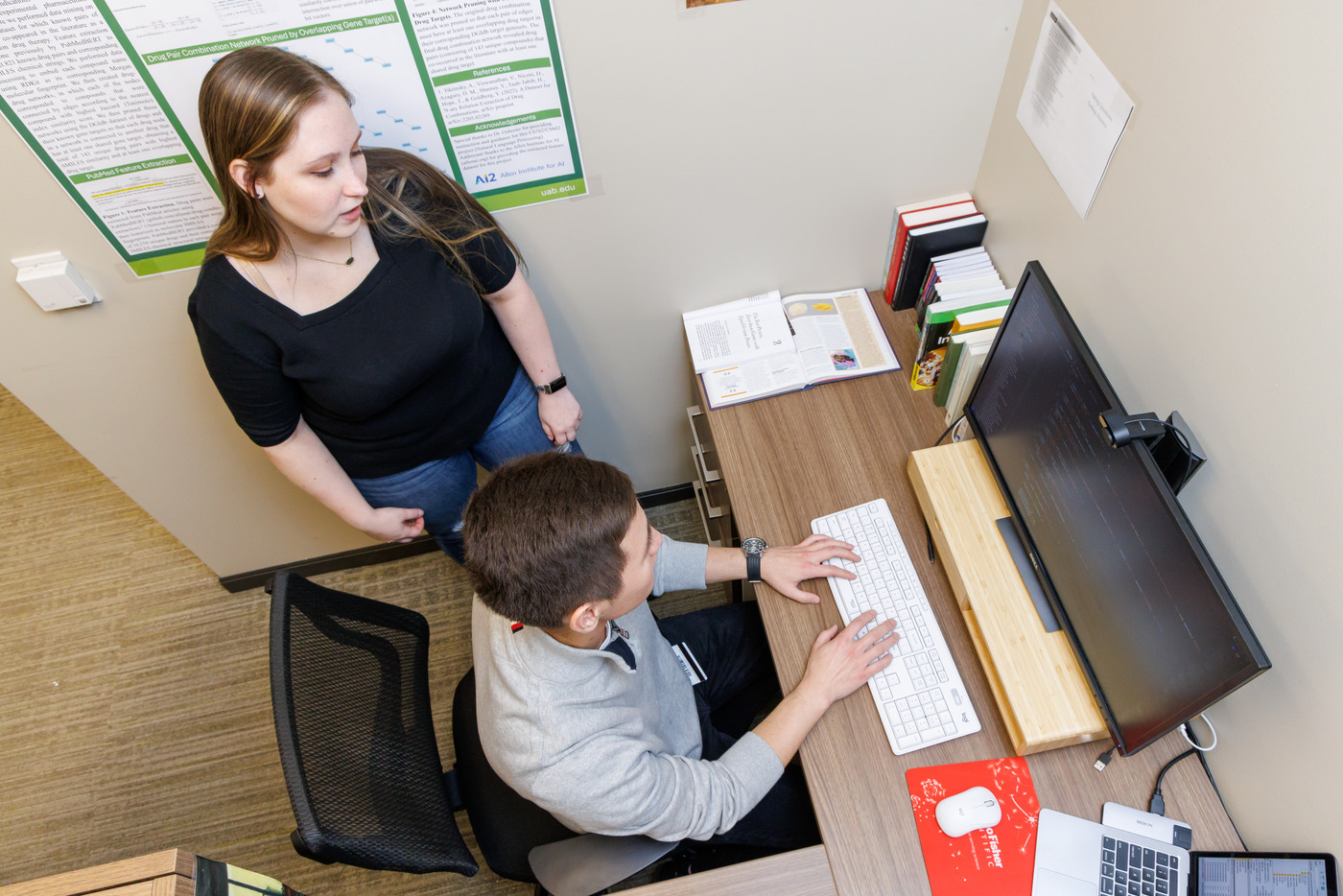Written by Brian C. Moon - October 9, 2024
 The Center for Clinical and Translational Science (CCTS) is proud to celebrate the establishment and growth of the Department of Biomedical Informatics and Data Science (DBIDS) in the UAB Heersink School of Medicine. DBIDS represents a significant advancement in biomedical research at the CCTS Hub. With its deep integration into clinical and translational science, DBIDS is revolutionizing the way data and informatics are used to accelerate scientific discovery and improve healthcare across the CCTS Partner Network.
The Center for Clinical and Translational Science (CCTS) is proud to celebrate the establishment and growth of the Department of Biomedical Informatics and Data Science (DBIDS) in the UAB Heersink School of Medicine. DBIDS represents a significant advancement in biomedical research at the CCTS Hub. With its deep integration into clinical and translational science, DBIDS is revolutionizing the way data and informatics are used to accelerate scientific discovery and improve healthcare across the CCTS Partner Network.The Evolution of DBIDS
The journey of DBIDS began in 2014 when the UAB Informatics Institute was established by the University of Alabama System Board of Trustees. Fast forward to 2023, and the institute’s expansion and achievements led to its elevation into a full department. Under the leadership of Dr. James J. Cimino, DBIDS continues to push the boundaries of informatics and data science, serving as a hub for interdisciplinary collaboration across the CCTS Partner Network. The department plays a pivotal role in integrating informatics solutions into healthcare, working closely with researchers, clinicians, and students to enhance patient care and accelerate biomedical research.
Supporting Research at the Hub and across the CCTS Partner Network
DBIDS offers a comprehensive suite of informatics and data science resources to support clinical and translational research across the CCTS Partner Network. These include:- Clinical Informatics: Leveraging electronic health records (EHR) to improve patient care and support clinical decision-making.
- Clinical Research Informatics: Enhancing tools for clinical trials and data management, including the integration of patient data for clinical research.
- Computational Genomics: Applying bioinformatics to study the human genome, uncovering meaningful insights into disease mechanisms and treatment responses.
- Translational Bioinformatics: Bridging the gap between benchside research and bedside care, translating complex data into clinical applications that improve human health.
Investigators have access to powerful tools, analytic pipelines, and collaborative digital environments developed by the department, like the i2b2 Data Repository, DataLENS, and U-BRITE. The team has also made significant strides in integrating information on patient-reported outcomes, genetic variants, social determinants of health and other national data sets to catalyze interdisciplinary collaboration and data-driven discoveries.
Collaborating for Success: Key Initiatives
 DBIDS has played a crucial role in large-scale projects, partnering with investigators throughout the CCTS Partner Network to leverage informatics expertise in research projects. DBIDS is a driving force behind groundbreaking studies and key initiatives, including:
DBIDS has played a crucial role in large-scale projects, partnering with investigators throughout the CCTS Partner Network to leverage informatics expertise in research projects. DBIDS is a driving force behind groundbreaking studies and key initiatives, including:- National COVID Cohort Collaborative (N3C): A national initiative leveraging electronic health record data to study COVID-19, with UAB being one of the first sites to contribute.
- All of Us: Created by the NIH, this program aims to accelerate health research by building a diverse database from over one million participants in the U.S. to inform personalized healthcare and a wide range of studies on health conditions.
- eMERGE: Funded by the National Human Genome Research Institute (NHGRI), eMERGE integrates DNA biorepositories with electronic medical records to advance large-scale genetic research and support genomic medicine implementation.
- OneFlorida+: A collaboration across Florida, Georgia, and Alabama, uniting researchers, clinicians, and patients to support a broad range of health research, including clinical trials and implementation science, while translating findings into improved health outcomes and policies for the southeastern U.S.
- TriNetX: A global health research network that enhances collaboration by connecting clinical investigators to extensive patient data. This real-world data network represents 70 billion clinical observations on 250 million patients from over 120 institutions worldwide.
- Alabama Genomic Health Initiative: In collaboration with HudsonAlpha and UAB Medicine, this initiative provides free genomic testing, interpretation, and counseling to residents across Alabama, aiming to prevent and treat diseases while advancing research on the role of genes in health and disease.
- ENACT (formerly ACT) Network: Building on the CTSA Consortium’s cohort discovery platform, ENACT allows researchers across CTSA hubs to conduct EHR-based studies on various diseases using data from over 142 million patients, supported by the NIH’s National Center for Advancing Translational Sciences (NCATS).
- Systems Pharmacology AI Research Center (SPARC): SPARC aims to advance the use of AI, systems biology, and quantitative pharmacology in drug discovery through research innovation and interdisciplinary collaborations.
These efforts underscore DBIDS' commitment to fostering collaboration, improving research efficiency, and driving innovation across the CCTS Partner Network.
Engaging the CCTS Partner Network
One of the key aspects of DBIDS is its commitment to sharing knowledge and resources across institutions. Through collaborative efforts with the CCTS, DBIDS supports bioinformatics, clinical research informatics, and AI-driven projects. Whether you're based at the CCTS Hub or at one of our Partner institutions, DBIDS offers opportunities to connect with leading experts and access powerful informatics tools that drive research forward.
Join the DBIDS PowerTalk Seminar Series
As part of its outreach and educational mission, DBIDS hosts the DBIDS PowerTalk Seminar Series, a virtual event open to the entire CCTS Partner Network. These seminars offer an excellent opportunity to stay informed about the latest advances in AI, data science, and biomedical informatics. John Osborne, Ph.D.To further explore the advancements in biomedical informatics, the DBIDS PowerTalk Seminar Series continues on Friday, October 11, 2024, at 10 AM (Central) via Zoom. The department’s very own John Osborne, PhD, Associate Professor, Department of Biomedical Informatics and Data Science, will be presenting "Generation and Application of Synthetic Data for Improved Clinical Text De-identification and Large Language Model Enhanced Disease Entity Linking." In his presentation, Dr. Osborne will discuss how augmenting data sets with synthetic data has been used to improve machine learning algorithm performance. With recent advances in Large Language Models (LLMs), the generation and application of high-quality synthetic text offer enhanced solutions to key challenges. Specifically, this talk will delve into using synthetic data to enhance the protection of patient privacy, improve de-identified clinical text generation, and train information extraction algorithms. Dr. Osborne will also cover optimal surrogate substitution strategies for Personal Health Information (PHI) and examine how these strategies impact downstream Natural Language Processing (NLP) tasks. Additionally, he will discuss the fine-tuning of the Llama model for Disease Entity Recognition and Normalization. Register now!
John Osborne, Ph.D.To further explore the advancements in biomedical informatics, the DBIDS PowerTalk Seminar Series continues on Friday, October 11, 2024, at 10 AM (Central) via Zoom. The department’s very own John Osborne, PhD, Associate Professor, Department of Biomedical Informatics and Data Science, will be presenting "Generation and Application of Synthetic Data for Improved Clinical Text De-identification and Large Language Model Enhanced Disease Entity Linking." In his presentation, Dr. Osborne will discuss how augmenting data sets with synthetic data has been used to improve machine learning algorithm performance. With recent advances in Large Language Models (LLMs), the generation and application of high-quality synthetic text offer enhanced solutions to key challenges. Specifically, this talk will delve into using synthetic data to enhance the protection of patient privacy, improve de-identified clinical text generation, and train information extraction algorithms. Dr. Osborne will also cover optimal surrogate substitution strategies for Personal Health Information (PHI) and examine how these strategies impact downstream Natural Language Processing (NLP) tasks. Additionally, he will discuss the fine-tuning of the Llama model for Disease Entity Recognition and Normalization. Register now!
Data2Discovery Gateway (D2DG) Special Interest Group
 The PowerTalk Series is complemented by the Data2Discovery Gateway (D2DG) Special Interest Group Pop-Up Series, a peer-driven forum that provides first-hand accounts on how to navigate large clinical research informatics resources and data enclaves.
The PowerTalk Series is complemented by the Data2Discovery Gateway (D2DG) Special Interest Group Pop-Up Series, a peer-driven forum that provides first-hand accounts on how to navigate large clinical research informatics resources and data enclaves. Join the next D2DG Pop-Up event on Thursday, October 31, 2024, 9-10 AM (Central) via Zoom when Dr. Andrew Crouse, Director of Research and Operations for the Hugh Kaul Precision Medicine Institute, will demonstrate the NCATS Translator, a powerful tool that uncovers associations between drugs, genes, and diseases. Learn how this platform integrates trusted data sources to aid researchers in discovering novel biomedical insights. Register here.
